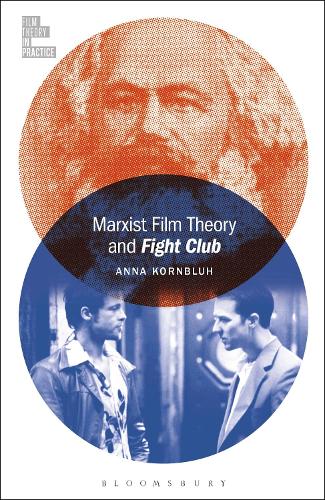
Marxist Film Theory and Fight Club
(Hardback)
Publishing Details
Marxist Film Theory and Fight Club
By (Author) Anna Kornbluh
Bloomsbury Publishing PLC
Bloomsbury Academic USA
2nd May 2019
United States
Classifications
Tertiary Education
Non Fiction
Film history, theory or criticism
Film scripts and screenplays
Far-left political ideologies and movements
791.4372
Physical Properties
Hardback
200
Width 127mm, Height 197mm
322g
Description
Anna Kornbluh provides an overview of Marxist approaches to film, with particular attention to three central concepts in Marxist theory in general that have special bearing on film: the mode of production, ideology, and mediation. In explaining how these concepts operate and how they have been used and misused in film studies, the volume employs a case study to exemplify the practice of Marxist film theory. Fight Club is an exceptionally useful text with which to explore these three concepts because it so vividly and pedagogically engages with economic relations, ideological distortion, and opportunities for transformation. At the same time, it is a very typical film in terms of the conditions of its production, its marketing, and its popularity. Adapted from a novel by Chuck Palahniuk, the film is a contemporary classic that has lent itself to significant re-interpretation with every shift in the political economic landscape since its debut. Marxist Film Theory and Fight Club models a detailed cinematic interpretation that students can practice with other films, and furnishes a set of ideas about cinema and society that can be carried into other kinds of study, giving students tools for analyzing culture broadly defined.
Reviews
[An] accomplished work of scholarship about an acclaimed film ... Analysing Fight Club helps us understand Marxist ideas about the violent, spiritually alienating world we live in ... Kornbluhs crash course in Marxism is admirably clear without being reductive. * Times Literary Supplement *
I would recommend it to anyone looking for a well-written introduction to Marxism, ideology, and aesthetics. * Film Matters *
A serious book that will benefit both those interested in Marxism itself and those whose interests lie within film studies more generally ... It is worthwhile for the reader to discover for themselves the richness of Marxist film theory explored in the book. * Marx & Philosophy Review of Books *
Kornbluh has devised a remarkable two-fisted engine that examines simultaneously and in turns Marxist film theory and Fight Club. She offers a rigorous and highly original analysis of the film, in which cinematic form and economic circumstances vie with and outstrip each other, and a superb demonstration of the dialectic at work. * Joan Copjec, Professor of Modern Culture and Media, Brown University, USA *
"The first rule of Fight Club is: You do not talk about Fight Club. So, whats the first rule of Marxist film theory If you or Anna Kornbluh cant talk about that either, her short sharp introduction nonetheless offers an expert account of what Marxism is and whymaybe more than everit matters. Moving elegantly between different theories of film and a film that does the work of theory, she both explains how several modes of Marxist analysis work and makes a powerful case for Marxisms status not as one method among many but rather as our best and maybe last chance to engage and to engage critically with the forms of a world we must find wanting. * Kent Puckett, Professor of English, University of California, Berkeley, USA *
Author Bio
Anna Kornbluh is Associate Professor of English at the University of Illinois, Chicago, US. She is the author of Realizing Capital (2013), and her articles on Marxist aesthetics have appeared in Mediations, Novel, the LARB, Understanding Film: Marxist Perspectives, Lacan & Contemporary Cinema, and the Bloomsbury Companion to Marx.
